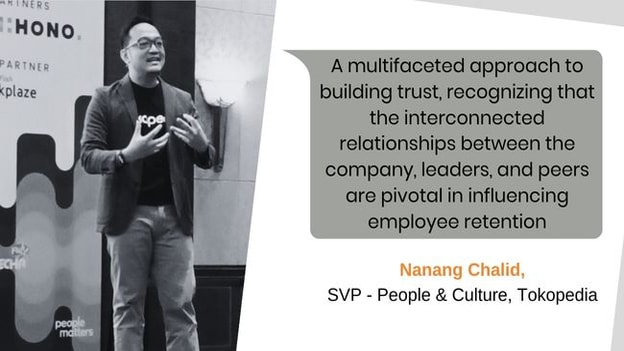Enchanted workplaces: Elevating talent retention through trust and recognition

“The only ones who can make sure the voice of the employees is represented are us, HR,” remarked Nanang Chalid, SVP - People & Culture, Tokopedia on the case study session, 'Design For The Unconventional: A Winning Story Of Democratising Employee Recognitions' at TechHR Pulse Indonesia.
Where’s the MAGIC?
Kickstarting the case study, Nanang added, “Let me present a quick puzzle. There's a magic word with five letters that makes the world go round. Any guesses? No, it's not 'CHANGE' But here's a hint: it's not 'MONEY' either. If you're thinking 'PEOPLE,' you're close but not quite there. The answer is not 'HUMAN' either. So, what's the word?”
Finally hinting at the answer, he said - it's more of an emotion than a reason. The magic word is ‘TRUST.' Adding, “In HR, the only joke we crack is about trust. Our daily mission is to build trust. In the evolving world, everyone has their space, but without trust, creating the true spirit of a company becomes challenging. So, as we dive into our daily tasks, let's remember that what we do is build trust. It's the key to fostering a genuine sense of unity within the company. Without it, navigating the intricacies of the corporate world becomes a formidable challenge.”
Three Levels of Trust
Diving further into Tokopedia’s concept – Trust Capital, Nanang explained, “In HR, we excel at organizing company and employee trust-building events, such as town hall meetings where leaders engage in fireside chats with their teams in intimate settings. We also orchestrate corporate-wide events, celebrating company anniversaries or catering to specific cultural needs or events tailored for regions like Indonesia. While these initiatives are impactful, they often require significant organizational effort, with HR sometimes taking on the role of event organizer (EO).”
However, beyond the grand events and organizational efforts lies a crucial aspect: the three levels of trust. It is:
- Trusting your company
- Trusting your leaders
- Trusting your peers
Explaining with an example he said, “When employees decide to resign, it often boils down to a breakdown of trust on one or more of these levels. They might express sentiments like, "I can't trust my company anymore," or "I can't trust my leaders," or even "I can't trust my colleagues at work." These perceptions drive the decision to leave. However, what's interesting is that even if someone harbours reservations about the company, they might stay if they have trust in their immediate boss and colleagues. Conversely, if they lack trust in both the company and their supervisor, the presence of positive workplace friendships can still influence their decision to stay.”
The multifaceted approach of Trust Capital
This dynamic, particularly observed among millennials, underscores the significance of trust capital across these three layers. It's a multifaceted approach to building trust, recognizing that the interconnected relationships between the company, leaders, and peers are pivotal in influencing employee retention, emphasised Nanang. Recognizing this, a critical question is posed: How can we create an ecosystem that empowers everyone – from leaders to employees – to cultivate their trust capital? How can employees foster trust among themselves? Prompting organisations to design initiatives that encourage the organic development of trust capital within their culture.
Addressing the challenges of recognition
“We recognized a challenge in our approach: the difficulty in effectively acknowledging both efforts and impact during performance appraisals. It's a common struggle when assessing someone who consistently puts in overtime versus an individual who, despite exceptional contributions, may not visibly exert the same effort, said Nanang. Adding, “This predicament arises due to the limited window of performance appraisals as the sole means of evaluating contributions. In response, we devised a solution within our ecosystem: a deliberate separation of efforts and impact. This strategy involves empowering leaders to recognize efforts at any time of the year, independent of the performance appraisal cycle."
Furthermore, a tactical budget was introduced to facilitate this, drawing inspiration from practices like spot awards prevalent in many US companies, which enable immediate recognition for exceptional efforts. It breaks away from the conventional approach of waiting for big events organized by top management. Nanang shared, "We decided to democratize this process, ensuring that leaders at all levels have the means to recognize efforts within their teams. To implement this initiative seamlessly, an in-house employee experience app was developed. Leveraging our position as a technology company, we collaborated with experts to address the challenge at hand. The result is a user-friendly, flexible, and scientifically designed App that allows leaders to recognize efforts and impact independently, fostering a culture of timely and meaningful appreciation.”
Transitioning to the next challenge – employee-to-employee recognition. Tokopedia aimed to enhance psychological safety within teams, emphasizing the importance of feeling accepted and fostering honest collaboration. "Considering our success in creating peer-to-peer products for consumers, we posed a question: Why not extend this approach to our employees? This solution involved creating an ecosystem for peer-to-peer employer recognition, encouraging everyone to appreciate their colleagues at any time. Recognizing that traditional in-person acknowledgements may not always be feasible, especially in today's fast-paced work environment, we launched another in-house app, which is experience-driven, simple, and fun. This holistic approach, addressing both leader-to-employee and employee-to-employee recognition, reflects our commitment to creating a workplace culture that values and celebrates the efforts and contributions of each team member," concluded Nanang.
















